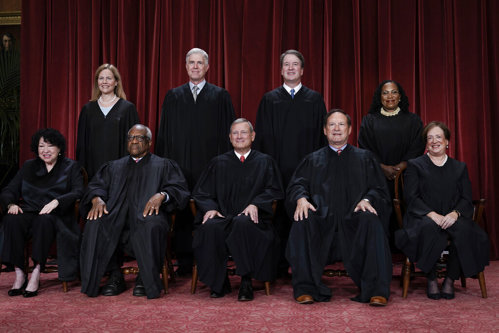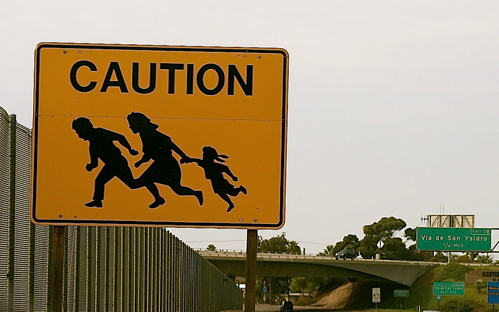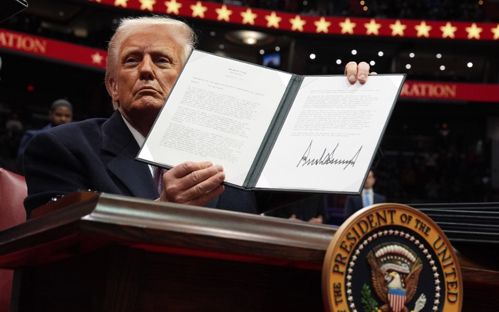It may not be that long before the high court weighs in again but it won’t be soon with a final word, Gerard Filitti, senior counsel for The Lawfare Project, said on American Family Radio Wednesday.
President Donald Trump’s executive order ending birthright citizenship, which applies to the children of non-citizens born in the United States, was met immediately with legal challenges by 22 states and the American Civil Liberties Union.
Some believe Trump is exceeding his authority to overturn a constitutionally protected right.
 Trump’s executive order contends that isn’t the case. “The 14th Amendment has never been interpreted to extend citizenship universally to everyone born within the United States,” it states.
Trump’s executive order contends that isn’t the case. “The 14th Amendment has never been interpreted to extend citizenship universally to everyone born within the United States,” it states.
Additional and often overlooked language in the amendment says those born in the U.S. must also be “subject to the jurisdiction thereof.”
It will be up to the Supreme Court, probably in more than one case, to decide if people crossing into the country illegally are subject to the jurisdiction of the United States, Filitti told show host Jenna Ellis.
“This is an executive order that will absolutely make it up to the Supreme Court, probably twice, before we know whether this is constitutional,” he said.
Don’t miss the language
When a final word finally comes, the often-overlooked language will have played a key part, he says.
“When you're here illegally, it means you're hiding from the jurisdiction of the United States. You're not submitting to it. Otherwise, you'd have gone through the (legal) process,” Filitti said.
 The topic of birthright citizenship is not ground often covered in the nation’s highest court.
The topic of birthright citizenship is not ground often covered in the nation’s highest court.
“The last time they looked at this was really at the end of the 1800s. That case basically affirmed that people born in the U.S. are citizens,” Filitti said.
But that ruling, United States v. Wong Kim Ark, came with a caveat.
“It turned on that the person’s parents were legally in the United States,” Filitti said.
The case involved Wong Kim Ark, born in 1873 in San Francisco, to Chinese immigrant parents.

The Court then held that Wong Kim Ark, under the U.S. Constitution, was guaranteed birthright citizenship.
“That was an erroneous and incorrect interpretation of the 14th Amendment Citizenship Clause, but even on its face, Wong Kim Ark only applied to children of legal aliens,” attorney and conservative journalist Josh Hammer wrote on X.
The Supremes did not address the issue again until 1982 in Plyler v. Doe, commenting that birthright citizenship also applied to the children of illegal aliens.
But that came as a footnote, Hammer pointed out, which does not appear in the main text of a ruling and is not binding law.
“The footnote to it in Plyler was pure unbinding dicta, and it is substantively incorrect on multiple levels,” Hammer wrote.
Solid legal standing
Filitti believes the final word, whenever it comes, will side with Trump’s executive order.
The 14th Amendment was passed by Congress in 1866 and was added to the Constitution in 1868. Its aim was to protect the citizenship rights of former slaves should those rights be declared unconstitutional by the Supreme Court and to prevent Congress from altering those rights in the future by a simple majority vote.

“It wasn’t contemplating illegal people coming to the country illegally then their children getting citizenship,” Filitti, perhaps summarizing the argument, said.
The Supreme Court will side with the Trump administration not because there are more conservative justices than liberal ones but because of how it has operated under Chief Justice John Roberts, Filitti said.
“What we've seen over the last 20 years from the Roberts Court essentially is that they look at the circumstances, at what was going on at the time that laws or constitutional amendments were written in order to consider how to interpret them,” Filitti said.
ACLU sees 'reckless' EO
The ACLU has declared the order unconstitutional.
“It’s also a reckless and ruthless repudiation of American values. Birthright citizenship is part of what makes the United States the strong and dynamic nation that it is,” the group said in a statement.
 The order seeks to create a permanent subclass of people who are denied full rights as Americans, the ACLU, known for its radical leftist attorney, argued.
The order seeks to create a permanent subclass of people who are denied full rights as Americans, the ACLU, known for its radical leftist attorney, argued.
The Trump administration, citing the pushback as par of “the Left’s resistance,” is confident in its strategy to defend the order.
"Radical Leftists can either choose to swim against the tide and reject the overwhelming will of the people, or they can get on board and work with President Trump to advance his wildly popular agenda," Harrison Fields, White House principal deputy press secretary, told Fox News Digital.
Strength in simplicity
Filitti predicts there is strength in the executive order because it’s focused and tightly written. It’s not robbing anyone of the right to vote, he says, because illegals already do not have that right.
“It’s a masterpiece of simplicity,” Filitti said. “It doesn’t go too far.”
If Trump can back the order with clear communication, he’ll increase public support for the order, Filitti said.
“People here illegally should not be benefiting from the privileges of citizenship," the attorney concludes. "If he makes that argument, you’ll have more support for it, and I think the courts will be inclined to rule correctly.”







